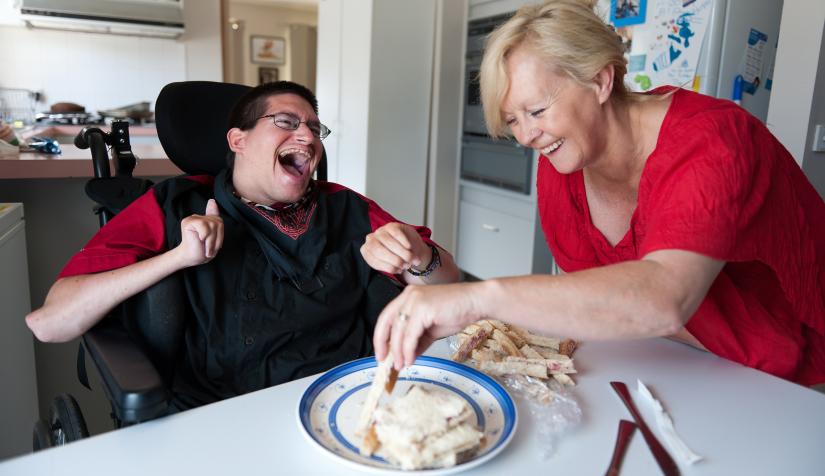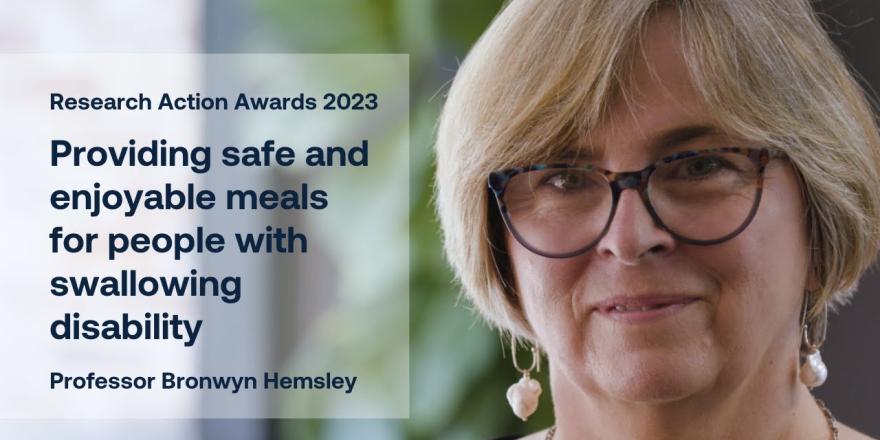Food and eating are an important part of the human story in all cultures. Sharing food underpins community, relationships, good health and wellbeing. So what happens when a person has difficulty swallowing?
“Swallowing is something most of us take for granted. However, an estimated 8 per cent of the world’s population have dysphagia or difficulty swallowing,” says Professor Bronwyn Hemsley, Head of Speech Pathology at UTS.
“Dysphagia affects an estimated 50 per cent of people with cerebral palsy, intellectual disability or stroke. This not only impacts on their health and quality of life, but their safety.”
“Tragically, choking on food and aspiration pneumonia, a lung infection related to breathing in food, fluid or saliva, are some of the leading causes of preventable death in residential care settings.”
In fact, coughing or choking on food is so common for many people with disability that support workers might think of it as normal.
People with disability also often say, “you know, I always cough on my food”, not realising there are options and opportunities to prevent it.
“As a speech pathologist, I thought about the scale of how many people must be having not just unpleasant mealtimes, but dangerous ones. Reading about the deaths of people with disability due to choking, I resolved to do something about it,” says Professor Hemsley.
Learning about safer meals
In 2020, the National Disability Insurance Scheme Quality and Safeguards Commission (NDIS Commission) calledfor training to be developed for support workers to prevent choking incidents.
Professor Hemsley and the UTS team were awarded $720,000 to establish the Co-Creating Safe and Enjoyable Meals for People with Swallowing Disability training program.
The large interdisciplinary team, which included two researchers with swallowing disability, engaged with a consortium of 15 self-advocacy, national allied health associations, disability service providers, and a consultant chef.
"It was great to lead this inclusive group, who really pulled together to co-design the training with authentic and immersive learning scenarios that reflect real-world situations," Professor Hemsley says.
"Co-creating the training with skilled learning designers at Studio 3 Learning, we are continually expanding the learning scenarios to include other populations including older people in aged care. We also adapt translations for use in other countries or in multiple languages."
Shortly after the project started, the Victorian Department of Families, Fairness and Housing added funding of $180,000 to enable 5 disability organisations to have staff trained in mealtime assistance.
The resulting one-day online training workshop was designed to be COVID-19 safe and accessible for disability workers located anywhere in Australia. It was made available as a UTS Open course in March 2021.
The training workshop consists of four modules covering:
the vital importance of providing person-centred mealtime assistance
what to look for in swallowing difficulty and how to respond to choking
preparing food textures for safe and enjoyable meals, and
the use of assistive technology.
"Importantly, we also focus on the cultural aspects of meals, and the values people hold in relation to food - these all impact on the mealtime experience," Professor Hemsley says.
All project materials are freely available from UTS with most hosted on the website www.enjoysafemeals.com. These include a trainer guide, a learner workbook and a series of videos, animations, illustrations, and audio resources.
Award-winning research impacts on care
Although the project was due to run for one year, it was so successful it was extended and continues to be self-sustaining today.
The UTS team have now provided training for well over 1,000 support workers across Australia and Professor Hemsley is often consulted for input on government policy relating to dysphagia and mealtimes, amendments to quality standards, practice alerts and legislation.
“I have consulted to the NDIS regarding amendments to quality standards, practice alerts, and legislation,” she says.
“I also worked closely with them to make sure the language and content of the new NDIS Commission’s orientation e-learning module Supporting Safe and Enjoyable Meals complemented our training.”
In one of the most positive impacts of this work, disability workers are trained using consistent language and standards no matter where they work in Australia. This was not the case previously.
The ongoing momentum of the project speaks for itself. Professor Hemsley has been an invited speaker and contributor at high profile conferences, summits, podcasts and reports across Australia and the UK. The training has also been adapted and delivered in Vietnam.
The NDIS Commission’s Supporting Safe and Enjoyable Meals module has now been completed by 70,000 people, and won the ‘Tech for Good’ category of the TechDiversity awards in 2023.
In further recognition of the positive impact this work, Professor Hemsley won a prestigious Sax Institute Research Action Award in November 2023, which celebrates outstanding research that improves health and wellbeing.
“Our research is having a real impact in an area that affects so many people but often goes unnoticed and poses a significant hazard to safety and enjoyment. I’m very pleased to see our team’s work recognised with this award,” Professor Hemsley says.
This is not the end of the journey, however. The long-range impacts of this project will be monitored well into the future for any evidence of real change.
“We hope this will be seen in the reduction of aspiration-related illness related to dysphagia, hospitalisations and deaths due to choking on food.”




